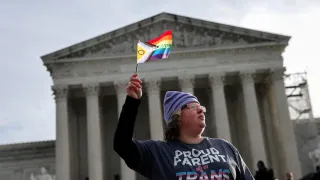December 12, 2014
White House Swings Behind Huge $1.1T Spending Bill
Kilian Melloy READ TIME: 4 MIN.
House Republican leaders narrowly quelled a revolt among their conservatives Thursday, then worked to overcome Democratic opposition to legislation to provide $1.1 trillion in government spending and chart a new course for selected, highly shaky pension plans.
The White House said President Barack Obama would sign the measure, triggering a rare public rebuke from Democratic leader Nancy Pelosi, who said she was disappointed.
"It is a compromise and it does fulfill some of the many of the top-line priorities that the president himself has long identified," said White House press secretary Josh Earnest. He also said Obama did object to other portions of the 1,764-page spending and pension measure.
The developments coincided with the approach of a midnight expiration of existing federal funding, but there was no threat of a government shutdown - or even evidence of the attendant brinkmanship so pervasive in recent years.
There was unusual drama in the House, though, on the final major bill of a two-year Congress.
Conservatives sought to torpedo the measure because it leaves Obama's immigration policy unchallenged. But Speaker John Boehner patrolled the noisy, crowded House floor looking for enough GOP converts to keep it afloat.
He found them - after the vote went into overtime - in retiring Rep. Kerry Bentivolio of Michigan and Rep. Marlin Stutzman of Indiana. The vote to allow the measure to advance was 214-212.
If there was political drama in the House, there was something approaching tenderness in the Senate, where several lawmakers are ending their careers. Sen. Tom Coburn, R-Okla., choked up as he delivered a farewell speech from his desk, and Republicans and Democrats alike rose to applaud him when he finished speaking.
The spending measure is one of a handful on the year-end agenda, with the others ranging from an extension of expiring tax breaks to a bill approving Obama's policy for arming Syrian forces fighting Islamic State forces.
The $1.1 trillion legislation provides funding for nearly the entire government through the end of the budget year next Sept. 30, and locks in cuts negotiated in recent years between the White House and a tea party-heavy Republican rank and file.
The only exception is the Department of Homeland Security. It is funded only through Feb. 27, when even the specter of a shutdown will be absent and Republicans hope to force the president to roll back an immigration policy that promises work visas to an estimated 5 million immigrants living in the country illegally.
When Congress convenes in January, Republicans will have control of the Senate for the first time in eight years, and their strongest majority in the House in more than eight decades.
The provision relating to financially failing multi-employer pension plans would allow cuts for current retirees, and supporters said it was part of an effort to prevent a slow-motion collapse of a system that provides retirement income to millions.
"The multi-employer pension system is a ticking time bomb," said Rep. John Kline, R-Minn., who negotiated the agreement privately with retiring Democratic Rep. George Miller of California, retiring after 40 years in Congress.
The Pension Benefit Guaranty Corp. estimates that the fund that backs multi-employer plans is about $42.4 billion short of the money needed to cover benefits for plans that have failed or will fail.
Miller said the legislation gives retirees the right to vote in advance whether to enter a restructuring that could cut their benefits. He, Kline and others said the alternative to the legislation might be an even deeper reduction in benefits.
More than 10 million people are covered by multi-employer the plans, which involve agreements between labor unions and groups of companies, mostly in construction and transportation.
The plan drew a mixed reaction from unions and the opposition of the AARP, but the White House written statement on the legislation did not mention it as a concern.
It did raise objections to a provision that will rollback one of the regulations imposed on the financial industry in the wake of the economic collapse of 2008, and a separate element of the bill that permits wealthy contributors to increase the size of their donations to political parties for national conventions, election recounts or the construction of a headquarters building.
Democrats cited the same issues, but Boehner on Wednesday rejected a request from Democrats to jettison either or both of the provisions. Republicans noted that 70 members of the Democratic rank and file supported easing the bank regulations on a stand-alone vote in October of last year.
Remarkably, there was relatively little controversy about the spending levels themselves that form the heart of the bill.
Democrats pointed to increases in enforcement funding for the Securities and Exchange Commission and the Commodity Futures Trading Commission, as well as increases for health research.
Obama got most of the money he wanted to fight Ebola.
Republicans noted the bill reduced staffing at the Environmental Protection Agency to levels last seen in 1989, and claimed credit for a provision prohibiting the U.S. Fish and Wildlife Service from placing the sage-grouse on the endangered species list.
___
AP writers Stephen Ohlemacher, Erica Werner, Alan Fram and Chuck Babington contributed to this story.
Kilian Melloy serves as EDGE Media Network's Associate Arts Editor and Staff Contributor. His professional memberships include the National Lesbian & Gay Journalists Association, the Boston Online Film Critics Association, The Gay and Lesbian Entertainment Critics Association, and the Boston Theater Critics Association's Elliot Norton Awards Committee.






